Florida college installs 700 kW floating solar array | Projects Weekly

This edition of Projects Weekly highlights several innovative installations and initiatives across the solar industry. First up is Florida’s Nova Southeastern University becoming the first university in the United States to install a commercial floating solar photovoltaic system. But wait, there’s more! Avangrid signed a power purchase agreement (PPA) with Amazon for the 57 MWdc Oregon Trail Solar facility in Gilliam County, Oregon. Lightstar Renewables celebrated the completion of New York’s first agrivoltaics project. Ever.green has agreed to a long-term purchase of High-Impact Renewable Energy Certificates (RECs) with Wells Fargo to support a 28 MW solar project in Lee County, South Carolina. OCI Energy successfully financed its 120 MW Project Alamo City, a flagship battery energy storage system (BESS) in development in Bexar County, Texas. Nofar USA has secured more than 1 GW of solar development projects across multiple U.S. markets. Aspen Power acquired two solar projects in Northampton, Pennsylvania, with a combined capacity of 6.85 MWdc. Nexus announced $220 million in new funding for Project Goody, a 171.72 MWac solar project combined with a 237 MWh storage project in Lamar County, Texas. And finally, Verogy has begun construction on its sixth project this year under Connecticut’s Shared Clean Energy Facility (SCEF) program. Keep reading to get all the deets!
Floriday’s Nova Southeastern University powers student housing with floating solar
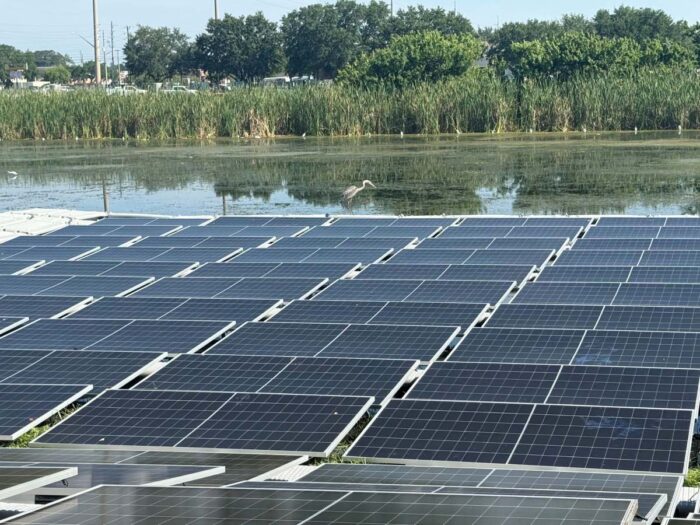
Nova Southeastern University (NSU), in Fort Lauderdale, Florida, has become the first university in the United States to host a commercial floating solar photovoltaic (FPV) system. The 700kW array, developed by D3Energy, will directly power student housing on campus and marks a milestone in bringing clean energy to higher education.
“This installation at NSU demonstrates how floating solar can deliver real benefits for institutions that may not have the land or rooftop space for large-scale solar,” said Stetson Tchividjian, managing director of D3Energy, which specializes in floating solar development in the United States, “We’re proud to be pioneering solutions that reduce costs and support sustainability goals, while opening the door for universities to lead by example in renewable energy adoption.”
Cool factor: Floating solar is one of the fastest-growing clean energy technologies worldwide. The FPV system spans nearly two acres and includes 1,200 solar modules secured with an advanced anchoring system built for hurricane-force winds. It uses Ciel & Terre’s Hydrelio floating platform, a global leader in FPV manufacturing. Construction is underway, with grid connection expected by year’s end. Once complete, the project will offset a significant share of the electricity needs at Mako Hall, Nova Southeastern University’s latest student housing complex, providing clean energy directly where students live and study.
Avangrid’s new Oregon Trail Solar project will help power data centers

Avangrid Inc., signed a PPA with Amazon for energy from a new solar project called Oregon Trail Solar. The 57 MWdc (41 MWac) facility will be located in Gilliam County, Oregon, and will supply renewable energy for Amazon data centers in the region. The project will be operational in 2027.
“This agreement reflects Amazon and Avangrid’s commitment to delivering reliable energy solutions that will help meet America’s growing energy needs and support the growth of critical infrastructure,” said Jose Antonio Miranda, Avangrid CEO. “Oregon Trail Solar builds on our strong presence in Oregon and deep partnership with Amazon, and we’re proud to help power the future with projects that bring lasting economic benefits to local communities, bolster our nation’s energy independence, and maximize energy production.”
Cool factor: Oregon Trail Solar represents the second recent renewable energy PPA between Avangrid and Amazon in the Pacific Northwest, adding to a previously announced deal for power from the Leaning Juniper IIA repower project, also located in Gilliam County. Avangrid and Amazon have agreements to generate power from several renewable energy projects in Illinois, Ohio and North Carolina as well.
Construction of Oregon Trail is expected to generate 200 jobs, mostly filled by local union labor. It will use over 100,000 solar panels and produce the same amount of electricity used by about 10,000 U.S. homes each year. Operations at Oregon Trail will also support several new full-time jobs in the community. Over its lifetime, Avangrid expects the project to contribute $6 million in combined PILOTs (payment in lieu of taxes), as well as property taxes for Gilliam County which will support a variety of public services, including schools and infrastructure.
Oregon Trail will add to Avangrid’s longstanding presence in the state, with its oldest project dating back to 2001. Today, the company operates 2.5 GW of capacity in Oregon. Avangrid also maintains its National Training Center in neighboring Sherman County and a large corporate office in Portland.
Lightstar Renewables launches New York’s first agrivoltaics project
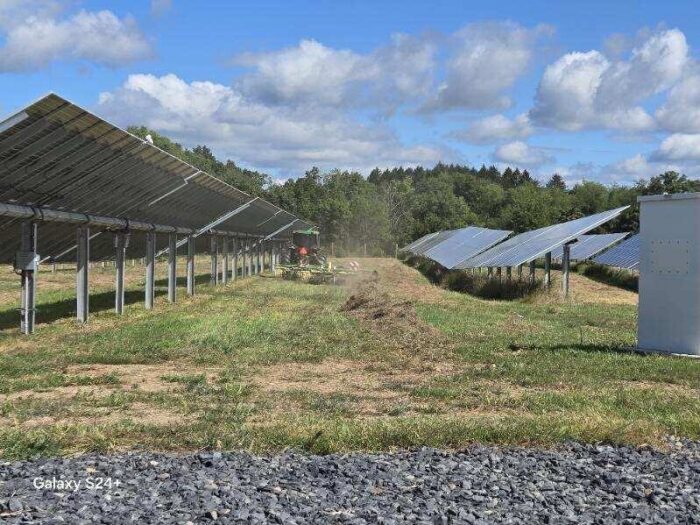
Lightstar Renewables LLC hosted a ribbon-cutting ceremony to celebrate the groundbreaking for Plains Road agrivoltaics project Montgomery, New York. The commissioning event was held at the DiMartino Farm, drawing attendance from state officials, agricultural leaders, and local media, and other local faming families. Representing Assembly Member Brian Maher, whose legislative support was instrumental in the project’s development, was his chief of staff, Meghan Hurlburt. She stood alongside representatives from American Farmland Trust (AFT) and Iain Ward, farmer, founder, and CEO of Solar Agricultural Services Inc. (SolAg).
“Today marks a turning point for sustainable development in New York,” Maher said in a statement. “The Plains Road project demonstrates how we can honor our agricultural heritage while meeting our clean energy goals. This is the kind of innovative thinking we need to build a resilient future for rural communities.”
Cool factor: The Plains Road project marks New York’s first agrivoltaics installation. The ribbon-cutting ceremony highlighted the unique design features that allow hay planting and harvesting equipment to operate seamlessly around the solar facility. The project will also add two acres of vegetable production, providing opportunities for new entry farmers while generating enough clean energy to power 466 homes annually.
Ever.green uses RECs to support 28 MW solar project in South Carolina
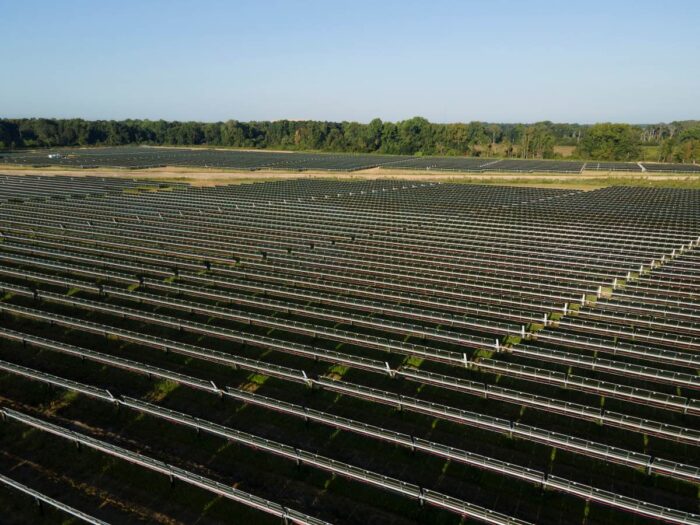
Ever.green partnered with Wells Fargo through a long-term purchase of High-Impact RECs to support a 28 MW solar project in Lee County, South Carolina. The deal displays how corporate energy buyers can accelerate the deployment of new renewable energy projects. The solar installation, developed by Headwater Energy, will generate approximately 50,000 MWh of electricity annually.
“High-Impact RECs are making it easier for companies to directly support new, impactful projects,” said Cris Eugster, CEO of Ever.green. “This project is a powerful example of how forward-thinking buyers can accelerate the energy transition while advancing grid resilience.”
Cool factor: Ever.green’s High-Impact RECs are renewable energy certificates sourced from yet-built clean energy projects via long-term, fixed-price forward contracts that are material to the project’s finance-ability. Projects are selected for their ability to maximize climate impact, minimize environmental harm, and deliver social benefits.
The Bishopville project uses low-carbon, domestically manufactured solar panels, helping to create new U.S. manufacturing jobs while strengthening the domestic energy supply chain. The panels use thin-film technology, which performs well in hot and humid climates, and they are both sustainably constructed and designed to be recycled at their end-of-life. A comprehensive environmental assessment of the project ensured compliance with biodiversity and land use protections, including the safeguarding of wetlands and floodplains through best management practices. Non-reflective panels and habitat preservation efforts have helped minimize impacts on 12 migratory bird species. At the end of its useful life, the site will be fully restored with native vegetation to preserve local ecosystems.
OCI Energy, ING finalize construction financing for battery project in Texas
OCI Energy has closed on the construction financing for its Project Alamo City, a flagship BESS installation under development in Bexar County, Texas. OCI Energy selected ING to underwrite the construction financing package which includes a construction-to-term loan, a tax equity bridge loan, and letters of credit. ING served as sole coordinating lead arranger, sole bookrunner, and sole green loan coordinator, and will also act as administrative agent. The relationship between ING and OCI Energy has proven instrumental in advancing the project from concept to construction.
“This project not only advances the deployment of cutting-edge battery storage technology in Texas, but also demonstrates the power of collaborative, innovative financing to accelerate the energy transition,” said Sven Wellock, head of renewables and power, Americas, ING.
Cool factor: With a planned capacity of 120 MW and with a four-hour battery duration, Project Alamo City will be a significant standalone battery storage installation in Texas, delivering 480 MWh of grid-strengthening storage capacity for CPS Energy.
“Project Alamo City represents a bold step forward in our commitment to enhancing grid stability and ensuring long-term energy reliability,” said Sabah Bayatli, president of OCI Energy. “It also marks OCI Energy’s return as a developer-owner-operator in the project finance space, and partnering with a financial institution like ING has been instrumental in bringing this transformative project to fruition.”
OCI Energy had previously announced the execution of a 20-year Storage Capacity Agreement with CPS Energy, the largest municipally-owned electric and natural gas utility in the United States. Under that agreement, OCI Energy is responsible for the development, financing, construction, and ownership of Project Alamo City, and CPS Energy will have operational control. Project Alamo City is expected to enter commercial operation in Q3 2027.
Nofar USA adds 1 GW to solar project portfolio
Nofar USA has secured more than 1 GW of solar development projects across multiple U.S. markets through a combination of acquisitions and exclusive development agreements. The transactions, completed in late August, expand the company’s portfolio and encompasses utility-scale and distributed generation projects with commercial operations expected to start between 2026 and 2029.
“These transactions mark a significant milestone in the expansion of our U.S. pipeline,” said Allon Raveh, executive chairman and CEO of Nofar USA, a wholly owned subsidiary of Nofar Energy. “By securing more than a gigawatt of projects across key renewable energy markets, including PJM, SPP and ERCOT, in combination with our ITC safe harboring strategy, I expect Nofar USA to grow its solar portfolio significantly in the next few years. This, combined with our growing energy storage portfolio which has already reached a contracted pipeline of 1.2 GWh, reinforcing our commitment to supporting America’s demand for clean power while generating long-term value for our shareholders”
Cool factor: The solar portfolio includes projects in various stages of development, from early-stage development through ready-to-build status. Projects span multiple regional transmission organizations and independent system operators, providing geographic and market diversification.
Nofar Energy operates across 10 countries with renewable energy and energy storage projects. The company has 2.4 GW of renewable energy projects connected or under construction globally. In the United States, Nofar has been expanding its presence through strategic acquisitions and partnerships, developing projects that range from distributed generation to utility-scale installations.
Aspen Power expands Pennsylvania portfolio with 6.85 MW in new solar projects
Aspen Power has closed on the acquisition of two solar projects in Northampton, Pennsylvania, with a combined capacity of 6.85 MWdc. These projects are the first projects to close under a portfolio totaling 18 MWdc under contract with Syncarpha Capital LLC. The ground-mounted systems are expected to generate almost 9 million kWh of clean energy annually.
“Solar is now the most affordable source of new electricity in the U.S., and even in a difficult national political environment, we are executing and bringing projects online,” said Jorge Vargas, CEO of Aspen Power. “Together with our partners at Syncarpha Capital, we are creating reliable, long-term income for landowners, affordable clean energy for residents, and tangible progress toward a more resilient grid. At this pivotal moment for the renewable energy industry, strong execution and strong partnerships are what will drive lasting economic and environmental benefits, and Aspen is proud to be leading that effort in Pennsylvania.”
Cool factor: Aspen Power has been highly active in Pennsylvania, with more than 100 MW of operating and in-construction assets across the state. As electricity demand grows, solar’s speed of deployment makes it a critical solution for meeting near-term energy needs. Pennsylvania’s target of sourcing 18% of its electricity from renewables by 2025 underscores the importance of these projects, which will contribute directly to the state’s clean energy goals.
The company has developed or acquired more than 600 renewable energy projects across 26 states in pursuit of a more affordable, reliable, and sustainable energy future.
Nexus secures $220 million, energy offtaker for Project Goody
Nexus Renewable Power LLC has closed on a series of transactions that together represent approximately $220 million of project funding for MRG Goody Solar and Storage (Project Goody), a 171.72 MWac solar project combined with a 237 MWh storage project located in Lamar County, Texas.
Goldman Sachs is making a preferred equity investment into Project Goody to support the hybrid tax equity financing. Nexus also executed a tax credit purchase agreement with respect to Project Goody. Meta is the power offtaker for the project, which will help match its data center electricity use with clean and renewable energy. This aggregate financing complements the previously announced $300 million construction-to-permanent financing facility with HPS Investment Partners, and the $100 million Nexus-Bad Carbon carbon credit financing joint venture.
Cool factor: Project Goody is named after, and honors the service of, Michael R. “Goody” Goodboe who died on Nov. 24, 2020, from injuries sustained while serving his country overseas. He was a highly decorated Navy SEAL and served his country with distinction in multiple theaters including Iraq, Afghanistan, Eastern Europe, and Africa. He is remembered for his warrior spirit, sense of humor, and high standards for himself and his comrades.
Project Goody is currently under construction, with a scheduled commercial operation date in the fourth quarter of 2025. It is the first in a series of projects being developed and constructed by Nexus. The project will provide employment opportunities and economic benefits to Lamar County, creating hundreds of construction jobs and contributing millions in long-term tax revenue to support the local school district and the community at large.
Verogy begins construction on sixth SCEF solar project in Connecticut
Connecticut-based developer Verogy has started construction on its sixth project under the state’s Shared Clean Energy Facility (SCEF) program in 2025. These projects, totaling more than 30 MW of renewable energy, enable Verogy to advance equal access to solar power and drive meaningful economic impact across Connecticut.
As part of its commitment to using domestically sourced materials and power generation technologies, Verogy continues to partner with Arizona-headquartered First Solar Inc. to supply its modules.
Cool factor: The SCEF program, overseen by the Connecticut Public Utilities Regulatory Authority (PURA), was designed to expand access to solar power, particularly for low- to moderate-income (LMI) households. Participating residents can subscribe to a portion of the electricity generated by a SCEF project and receive credits on their electricity bills, which results in long-term savings without installing any equipment on their own property.
“Verogy is committed to ensuring the benefits of renewable energy are felt across all communities, not just those with access to on-site solar,” said William Herchel, CEO of Verogy. “The SCEF program makes it possible for more Connecticut consumers than ever to participate in and benefit from the solar economy.”
Upon completion of these six SCEF projects, Verogy anticipates delivering enough clean energy to power more than 3,600 average homes every year. In addition, these projects will generate an estimated $975,000 in annual savings for LMI households and other utility customers for the next 20 years.


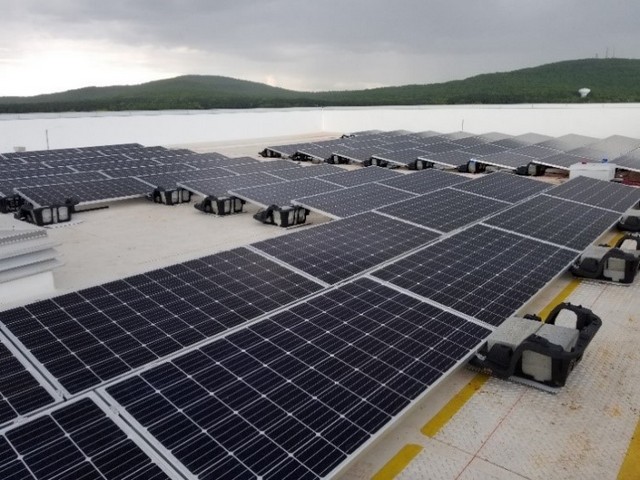

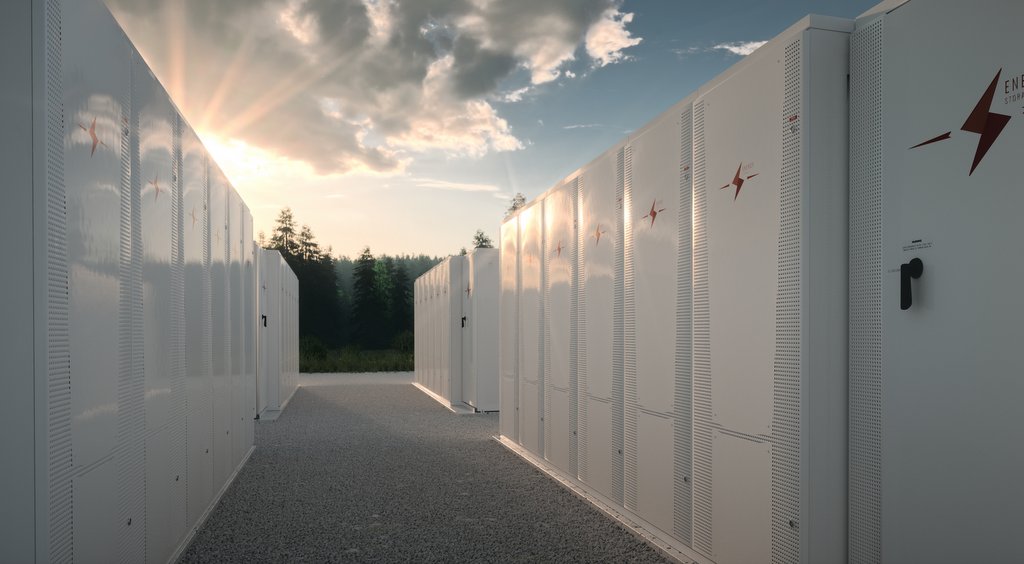
Comments are closed here.